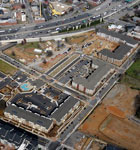When most people visit Manhattan, they see the glitz and glamour. Egbert Perry saw the communities that had none of that. “He was struck by the disparity between the wealthy neighborhoods and the contiguous blighted areas,” says Vicki Lundy Wilbon, an executive vice president of The Integral Group, the company Perry founded in 1993. “[He] began to think about how he could transform their relationship.”
Originally a real-estate-development company, The Integral Group has since grown into a multidisciplinary operation that constructs and manages diverse infrastructure and building-related programs in the United States and abroad. All of which is in service to Perry’s vision to assist communities in need. “Developing and managing properties, managing programs, building infrastructure—all of these play a part in transforming communities,” says Lundy Wilbon, who also serves as president and COO of Integral Development LLC, an operating division of the company.
An example of transformation is the four-phase development at Ashley Auburn Point in Atlanta. In a public-private partnership with the Atlanta Housing Authority and Atlanta-based Urban Realty, The Integral Group and architect Geheber Lewis Associates transformed an area that was formerly a public housing site into a vibrant neighborhood that is spurring economic development in the surrounding areas. “Ashley Auburn Point energized the area and is bringing tax revenues back to the city,” Lundy Wilbon says.
The first phase, Veranda I, brought 124 units of independent senior living to the area in 2008. The second phase, Ashley Auburn Point I, was an $18.5 million, 154-unit, multifamily rental community completed in 2010. Phase III brought more senior living in 2011, and the fourth phase completed the project in October 2011.
Each residential building is certified by EarthCraft, the regional sustainability program, and the development’s leasing center is certified LEED Silver. “Sustainability is becoming more important across all spectrums of real estate, and affordable housing has embraced that,” says Trey Williams, development director for The Integral Group. “I think we’re on the forefront of finding innovative ways to bring sustainability into our communities.”
The project’s green team, so to speak, was vast. It included Radiance Solar, which recommended Sunpower 230 photovoltaic panels for the buildings; Clearspan Components’s engineered wall panels, beams, floor trusses, and roof trusses; Miller Mechanical, which installed Pioneer low-flow faucets; ECM, an Atlanta-based electrician that installed Energy Star light fixtures in units and common areas; and Triad Mechanical, which installed 14-SEER-rated equipment in the rental units. In addition, an Amana geothermal HVAC system was used for the leasing office.
The HVAC systems led to significant energy savings: The $20,000 cost of the installed 14-SEER-rated systems was offset by an annual $20,000 energy savings, and the $75,000 cost of the geothermal system brought energy savings of 30–40 percent.
“Integral has always believed that sustainability starts with neighborhoods,” says Valerie Edwards, an executive vice president at The Integral Group. “We wanted our developments to hearken back to neighborhoods of old, where people of means lived with people of less means, old people with young people, blacks lived with whites. A mixed neighborhood that has the services you’d find in larger suburban neighborhoods is by its nature sustainable.”


